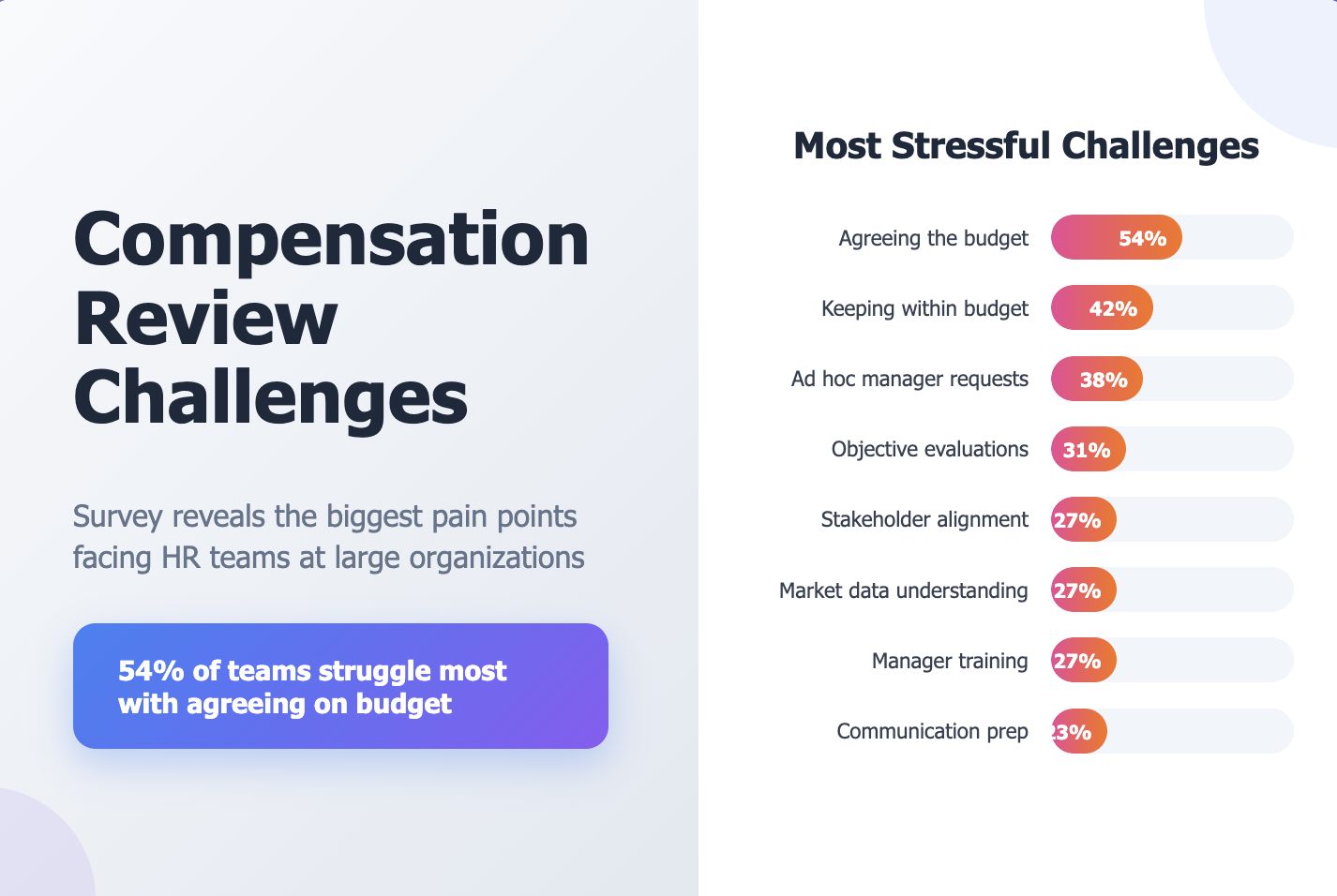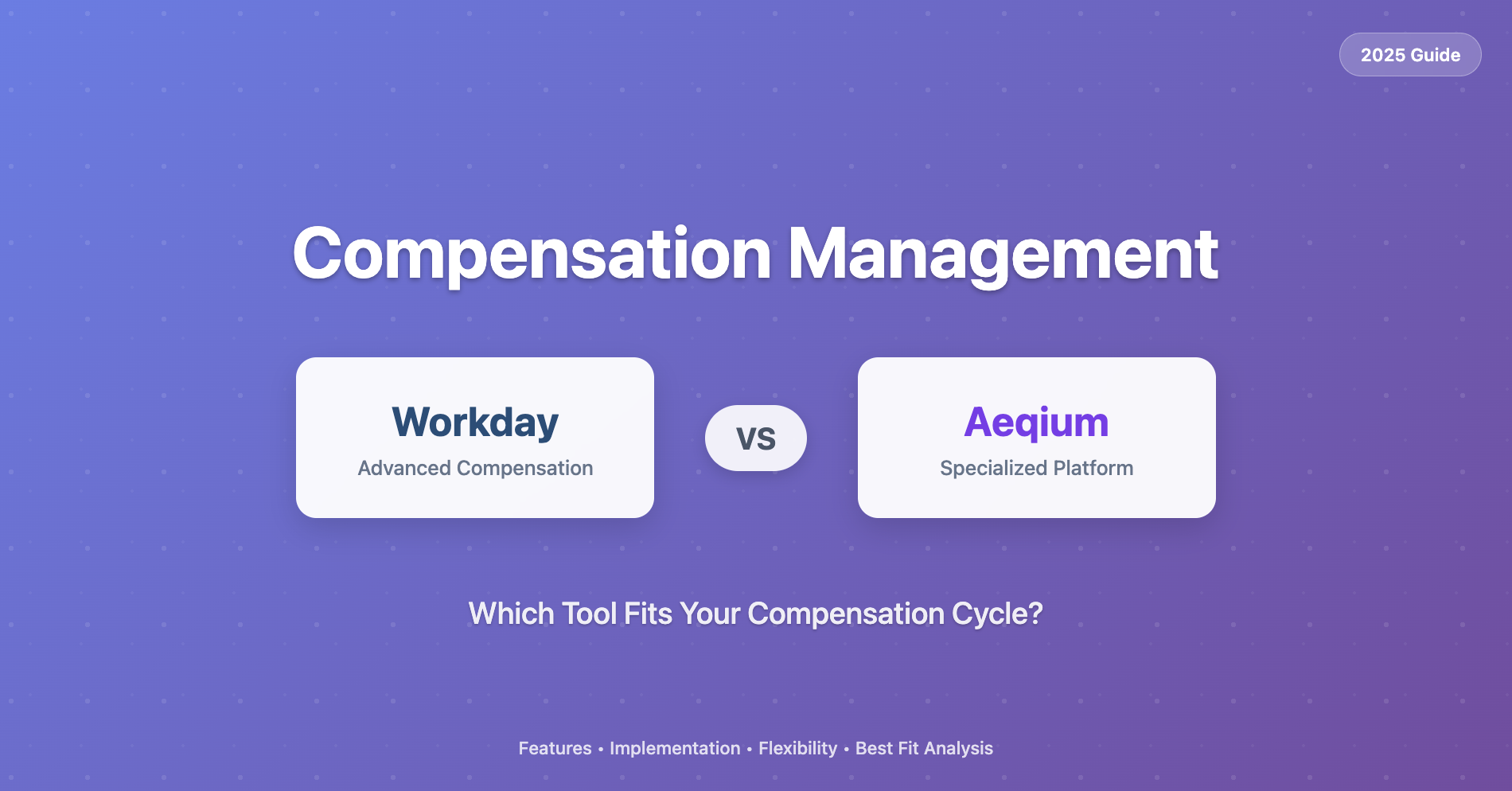The True Cost of Compensation Reviews—and How to Reduce It

Understanding the Impact of Compensation Review Cycles
Have you ever measured how much time your business invests in compensation planning? A compensation review cycle touches every level of an organization, from HR and finance teams to line managers and executive leadership. Yet, many companies vastly underestimate the cost and inefficiency of these processes—especially when managed manually.
A typical compensation management cycle involves:
- HR teams preparing and administering the cycle
- Managers reviewing employee data and making salary recommendations
- Leadership reviewing and approving compensation adjustments
For many companies, this process remains manual and spreadsheet-driven, leading to significant time drains, error risks, and missed opportunities for strategic compensation planning.
How Much Time Do Companies Spend on Compensation Reviews?
We surveyed HR leaders and line managers across 60 companies and uncovered a major theme: most organizations are investing more time than they realize in compensation reviews.
Key Findings:
- HR and finance teams spend an average of 6.5 weeks preparing for a cycle.
- 14% of teams take more than nine weeks to prepare compensation plans.
- 67% of senior managers using spreadsheets for compensation planning report losing a “moderate” to “considerable” amount of time that could be spent on strategic initiatives.
The Breakdown: How to Calculate the Cost of a Compensation Review Cycle
To fully grasp the true cost of a compensation review, let’s look at the two primary areas of time investment:
1. Managers Lose Valuable Hours to Compensation Reviews
Consider a company with 500 employees, of whom 100 are managers.
- If each manager spends five hours per week reviewing employees and collaborating on compensation planning software for three weeks…
- That results in 1,500 hours per cycle spent on compensation reviews.
This time represents a major opportunity cost as senior, strategic, and highly paid employees divert focus from mission-critical projects.
2. HR and Finance Teams Spend Weeks on Compensation Administration
Let’s say a company’s compensation cycle requires three employees across HR and finance.
- If each of them spends 8 hours per week on compensation reviews for 12-16 weeks…
- The company incurs 300-400 hours per cycle in administrative effort alone.
This is valuable time that could be used to focus on total compensation management strategies, talent retention, and improving compensation structures.
The Hidden Costs of Manual Compensation Planning
Beyond time investment, manual compensation planning introduces risks that can have serious financial and compliance implications:
- Compensation calculation errors: Overpaying or underpaying employees due to spreadsheet miscalculations.
- Currency conversion mistakes: Incorrect adjustments for international employees.
- Data security risks: Accidental exposure of sensitive salary bands and compensation details.
- Process inefficiencies: Difficulty tracking changes, approvals, and decision rationales.
When managing merit budgets of millions of dollars, even small human errors can lead to significant financial consequences and employee dissatisfaction.
How Companies Are Reducing Costs and Streamlining Compensation Reviews
Leading HR teams are addressing these challenges by adopting purpose-built compensation management software that:
- Automates cycle preparation by integrating HRIS, payroll, and performance data.
- Provides guided workflows to help managers complete reviews efficiently.
- Enhances collaboration by centralizing compensation communications and approvals.
Real-World Results: Companies That Transformed Their Compensation Planning
Companies that have transitioned to automated compensation planning software have seen massive efficiency gains:
- Hopper eliminated errors and cut compensation review preparation time by 90%.
- Braze reduced review time by 50% and cut cycle errors by 90% using structured workflows.
- Thoropass cut their cycle time by 50%, saving weeks of preparation time.
Take the Next Step in Compensation Management
If your company is spending weeks—or even months—on compensation planning, it’s time to consider an alternative. A compensation management system can reduce inefficiencies, minimize risk, and free your HR team to focus on strategic compensation planning rather than tedious administrative tasks.
Ready to see how automated compensation planning can transform your compensation cycles? Contact us today to learn more about how a modern compensation management platform can streamline your process and help your company scale.




